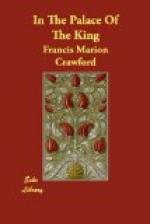The Princess walked slowly, weighing in the balance all there was to lose or gain. When she reached the head of the main staircase, she had not yet altogether decided how to act, and lest she should meet some one she returned, and walked up and down the lonely corridor nearly a quarter of an hour, in deep thought. Suddenly a plan of action flashed upon her, and she went quickly on her way, to act at once.
Don John, meanwhile, had read the letter she had sent him by the dwarf jester. When the King had retired into his own apartments, Don John found himself unexpectedly alone. Mendoza and the guard had filed into the antechamber, the gentlemen in waiting, being temporarily at liberty, went to the room leading out of it on one side, which was appropriated to their use. The sentries were set at the King’s door, and Mendoza marched his halberdiers out again and off to their quarters, while the servants disappeared, and the hero of the day was left to himself. He smiled at his own surprise, recollecting that he should have ordered his own attendants to be in waiting after the supper, whereas he had dismissed them until midnight.
He turned on his heel and walked away to find a quiet place where he might read the paper which had suddenly become of such importance, and paused at a Moorish niche, where Philip had caused a sacred picture to be placed, and before which a hanging silver lamp shed a clear light.
The small sheet of paper contained but little writing. There were half a dozen sentences in a clear hand, without any signature—it was what has since then come to be called an anonymous letter. But it contained neither any threat, nor any evidence of spite; it set forth in plain language that if, as the writer supposed, Don John wished to marry Dolores de Mendoza, it was as necessary for her personal safety as for the accomplishment of his desires, that he should make no attempt to see her for at least two days, and that, if he would accept this advice, he should have the support of every noble and minister at court, including the very highest, with the certainty that no further hindrance would be set in his way; it added that the letter he had burned had contained the same words, and that the two flowers had been intended to serve as a signal which it was now too late to use. It would be sufficient if he told the bearer of the present letter that he agreed to take the advice it contained. His assent in that way would, of course, be taken by the writer to mean that he promised, on his word. That was all.




